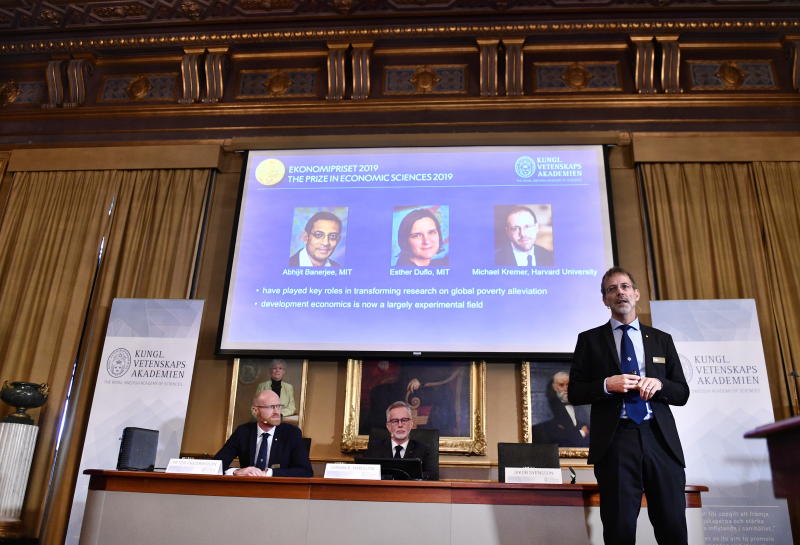Trio win 2019 Nobel economics prize for fighting global poverty
Sign up now: Get ST's newsletters delivered to your inbox

Member of the Nobel Committee for Economic Sciences Jakob Svensson speaking during the announcement of the winners of the 2019 Nobel Prize in Economic Sciences at the Royal Swedish Academy of Sciences in Stockholm on Oct 14, 2019.
PHOTO: AFP
Follow topic:
STOCKHOLM (BLOOMBERG) - Abhijit Banerjee and Esther Duflo of the Massachusetts Institute of Technology and Michael Kremer of Harvard University were awarded the 2019 Nobel Prize in Economics "for their experimental approach to alleviating global poverty."
"The research conducted by this year's Laureates has considerably improved our ability to fight global poverty. In just two decades, their new experiment-based approach has transformed development economics, which is now a flourishing field of research," according to a statement on Monday (Oct 14).
Banerjee, born 1961 in India, got his PhD in 1988 from Harvard University.
Duflo, who was born in 1972 in Paris, obtained her Ph.D in 1999 from MIT.
Kremer, who was born in 1964, got his doctorate from Harvard in 1992.
The three were recognised for their ability to divide the vast issue of tackling global poverty into smaller subjects, the committee said.
A Powerful Approach "In the mid-1990s, Michael Kremer and his colleagues demonstrated how powerful this approach can be, using field experiments to test a range of interventions that could improve school results in western Kenya," it said.
"Abhijit Banerjee and Esther Duflo, often with Michael Kremer, soon performed similar studies of other issues and in other countries. Their experimental research methods now entirely dominate development economics."
The theories that winners develop often take on a different status after a Nobel is handed out, which can result in greater influence on areas such as government policy and investment strategies.
Last year's prize went to William D. Nordhaus of Yale University and Paul M. Romer of the Stern School of Business in New York for bringing long-term thinking on climate issues and technological innovation into the field of economics.
Previous laureates have included Milton Friedman, Paul Krugman, Eugene F. Fama and Friedrich August von Hayek.
In 2009, three years before her death, Elinor Ostrom made history when she became the first woman to receive a Nobel in economics, which she shared with Oliver Williamson for their research into the limits of markets and how organizations work.
Annual prizes for achievements in physics, chemistry, medicine, peace and literature were established in the will of Alfred Nobel, the Swedish inventor of dynamite who died in 1896. The 9 million Swedish crown (S$1.25 million) prize in economic sciences was added by Sweden's central bank in 1968.

